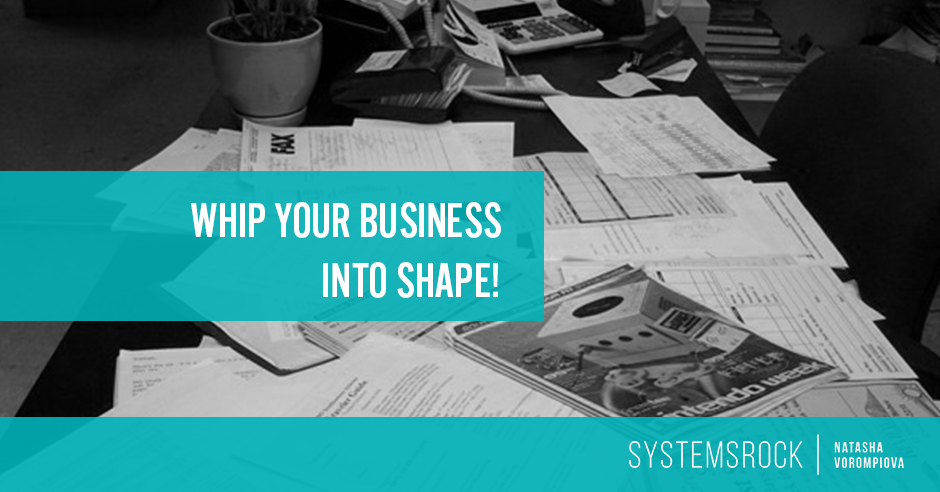You’re stressed out by the lack of efficiency in your business.
Nothing is running smoothly. Everything seems disorganized. You’re constantly in reactive mode. You’re stressed out and exhausted.
Let’s turn things around. Right now!
Pinpointing the exact problem is absolutely necessary.
If you’re like most of my clients, you’ve probably experienced one of the following situations more than once.
- You finished your blog post and sent it to your virtual assistant, who was supposed to format and publish it. You reviewed her work and wound up having to reformat the post because it wasn’t done the way you wanted it.
- You’ve already hosted a webinar, but you didn’t record all the steps required to set it up. Now you’re offering another webinar and have to once again spend time figuring out the entire process and probably dealing with the same mistakes.
- You spend more time searching for documents than actually using them.
- You keep offering your clients free services due to scheduling mishaps that you could have easily avoided if you’d just set up your online scheduler.
Maybe you haven’t experienced these exact situations, but I’m sure you’ve encountered similar ones and vowed to do something about them, but never did.
I get it. Trust me, I do.
You’ve got a ton of things to do.
So you keep making mental notes of what you “should” do, but finding time to actually act on them so that you can finally organize your day-to-day projects seems practically impossible.
You’ve tried time and time again. You’ve read books and asked for tips. You’ve received plenty of great advice, but nothing really stuck with you.
Every time you set aside time to get more organized, something comes up—a deadline, an emergency, or your sick child—and the extra time you planned to spend on organizing your business disappears. And so the madness starts all over again.
Late at night when you should be sleeping, you’re rerunning the events of the day in your head and reproaching yourself for not having the discipline to get more organized. You wish you’d inherited your mother’s great sense of organization. You fear you’ll never have a business that gives you the freedom you dreamed of when you first launched.
Let me tell you a secret. You don’t have to have any special skills or traits to have an organized business [Tweet This!].
Yes, it is difficult to bring organization to something that’s very disorganized.
But the good news is that you don’t need to make yourself into a new person or torture yourself by following structures that feel unnatural.
Once you learn how to confidently create and follow simple structures, staying organized will no longer feel beyond your reach. In fact, it will feel natural! How cool is that?
There’s only one requirement. . . .
You’ve got to stick with these simple structures.
If you’re just starting to get organized, your goal shouldn’t be a business that runs on its own. That goal is way too big, and what will happen is that you won’t be able to recognize and appreciate your small wins and you’ll quickly get discouraged because you’re not seeing the desired outcome. Instead. . . .
Your first step is to create consistency, which will transform your ability to get and stay organized. Plus, you’ll be surprised to discover how much you actually love following routines.
There’s no reason to get obsessed with organization. Take it one step at a time.
6 Tips to Make Getting Organized Easy & Fun
1. Embrace Baby Steps
Avoid getting overwhelmed. Break your organizational work into small, manageable steps that will guide you straight to your big goals.
Keep a running list of your *I should* tasks:
- I should create formatting guidelines for my VA
- I should record the steps I took to set up my last webinar
- I should organize my most frequently used documents
- I should sign up for an online scheduler
Identify the next step you need to take in order to take care of these small tasks. Aim to create tasks that take no more than 15 minutes to complete.
- Write down exactly what your VA needs to do in order to effectively format your blog posts
- Spend 15 minutes writing up your webinar process
- Think what categories you could create for your frequently used documents (for example, Blog Posts 2014, Clients, Graphics, Marketing, etc. In some cases, you’ll find it useful to create a number of subfolders within main folders, e.g, Blog Posts 2014 folder might contain Blog Posts, Guest Posts, and Images subfolders)
- Decide what features you need from an online scheduler.
Every week, complete one or two items from your master to-do list.
Baby steps. Step by step, by step, by step.
2. Consistency is the key to your happiness!
Block off 15 minutes a week.
It often seems impossible to spare even a minute, but here are some ways to find 15 minutes a week:
- Cut down on your Facebook and Internet surfing by 15 minutes
- Ask your partner to do the food shopping or …insert name of the errand… this week
- Get up 15 minutes earlier
- Say no to something you agreed to do simply out of your desire to be nice
3. Select strategies that feel right
Not everyone is going to systematize her business in the same way.
Use your creativity and rely on your inclinations to pick the routes of least resistance.
- Shoot a Video – For repetitive tasks that you do on your computer (e.g., uploading and formatting blog posts, scheduling social media updates or filling out online standard non-confidential forms) record your screen as you do them. Narrate the steps. Demonstrate what you do as if you were explaining the process to someone else.
- Record an Audio – For repetitive tasks that don’t require visual directions (e.g., the steps for preparing for a webinar, signing up a new client, or putting together a gift basket for a referral partner), you can record audio instructions and then turn them into a checklist.
- Role-Play – Streamline activities that require your soft skills (e.g., holding introductory sessions with clients, handling phone inquiries, or closing sales) by role-playing with someone, noting the questions you ask and recording the process.
4. Get an Accountability Partner
It’s much easier to live up to our word when someone else is there to hold us accountable.
Make yourself publicly accountable. Wanting to look good in other people’s eyes will inspire you to stay on point even when distractions emerge.
There are so many ways to do it:
- Email each other every day to state your accomplishments
- Get on a weekly Skype call to strategize and stay on track
- Tweets updates to your accountability partner?
- Create a tracking sheet in Google Drive, share it with your accountability partner, and check off your to-get-done items as you go through the week
- Sign up for Coach.me app based on the science of positive reinforcement and behavior change to make it easier for you to achieve your goals.
5. Join a Supportive Community
Two years ago, I launched Systematic Success. In the program I walk you through exactly how to set up—and stick to—routines so you get things done faster and in the most efficient ways.
One of the juiciest, most valuable parts of Systematic Success is the amazingly supportive community, which helps participants blast through their to-do lists.
Give yourself a few moments to see how it can come to your rescue!
6. Reward Yourself
Doing something consistently is an accomplishment, even if your actual task seems small and insignificant.
If you’ve been keeping your commitment to spend 15 minutes a week on organizational activities, acknowledge it. Think of ways to reward yourself:
- Buy yourself a bouquet of bright fragrant flowers on a grey winter day
- Pay a visit to your favorite spa
- Get a book you’ve been want to read
- Go for coffee with your best friend or ask your loved one to treat you to dinner at a restaurant you like
- Take an afternoon off and don’t feel guilty about it
WHAT ABOUT YOU?
How will you be making getting organized easy and fun?



Such a great list — achievable, simple and practical. I find that taking baby-steps is critical to my organization. Throughout the day, I ask myself, “What can I do right now to make things easier later?” And I’ve found that stealing a few moments here and there for planning and organization actually increases my productivity and saves time in the long run.
But I LOVE the idea of recording — either video or audio — a process. As my business gets more complex (and grows), I’m definitely putting that advice to work! Thanks!
My pleasure, Laura! Yes, recording saves me lots of time. I even reply certain kinds of e-mail with a video explanation rather than paragraph upon paragraph 🙂